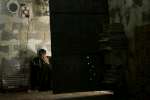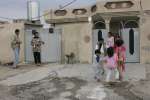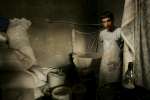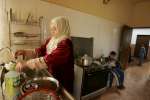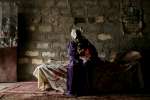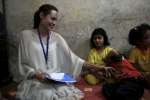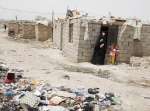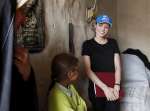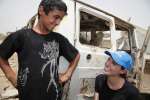Iraqi IDPs leave overcrowded Arbat for another home in Kurdistan region
News Stories, 29 June 2015
ARBAT, IRAQ, June 29 (UNHCR) – At 7 a.m., teams of workers began dismantling tents on the edge of Arbat Internally Displaced Persons (IDP) camp outside Sulaymaniyah in Iraq's Kurdistan Region. Within an hour families had bundled up their possessions for the short drive to a new camp location just five km away.
"We are all ready, just waiting here for the permission to go," said Asma sitting with her daughters under the shade of a neighbour's tent that was still standing. In front of her are the belongings her family has accumulated over the past few months of being displaced from her home in Yithrib, Salahadin: tents, foam mattresses, plastic bags stuffed with clothing, cooking pots and pans.
Bureaucratic mix-ups kept families waiting another three hours, but as temperatures in the camp topped 37 degrees Celsius just before midday, Asma's belongings were loaded onto a truck and her family was led into a minibus for the trip.
With nearly 3,000 families living in quarters designed for 700, Arbat IDP camp is one of the most overcrowded in Iraq. Water is in short supply, electricity is intermittent and the sanitation systems are inadequate. In some areas more than five families share a single toilet.
Like most camps now accommodating Iraqis forced from their homes by fighting between forces aligned with the Iraqi government and militants, Arbat was initially designed as a "transit" camp to provide only temporary housing. But as the crisis in Iraq enters its second year with no political or military solution in sight, the government and aid groups are being forced to seek longer-term humanitarian solutions for the more than three million displaced by violence across the country.
To ease the strain, UNHCR and its partners are beginning to move residents to better equipped facilities. One of the first, known as Ashti camp, was recently completed and will eventually accommodate some 1000 families.
When the camp was opened families moved into what looks like the foundation of a new village. Instead of pitched upon packed earth, tents here rest on poured concrete foundations. Plumbing is underground and electric wiring runs along poles that neatly follow the camp's grid layout.
"Honestly it's good, we feel so much better here," said Yassin, 35, also from Yithrib in Slahadin province. By afternoon his family was already settling into their new surroundings, behind him his wife patched up rips in their tent with needle and thread. "We had lack of everything, everything was overcrowded," Yassin said of life in Arbat IDP camp. Here, he expects a better quality of life, but is also cautious: "Today's just our first day, we don't know yet."
UNHCR officials hope that not only will the relocation improve life for the families moved to Ashti, but it will also improve life in Arbat by relieving some of the pressure on resources there.
"Today is a good day," said Anne Dolan, the head of UNHCR's Sulayminayah office, as the first families were moved into Ashti explaining that in total 1,000 families will make the move from Arbat. "It's good for the people moving and for Arbat camp," she said.
While Ashti camp is providing families with some of the facilities they need for an indefinite stay, families living in the camp say they are less able to provide for themselves today than they were nearly a year ago when the first fled.
Yassin was a farmer in Salahadin. Since he and his family fled last December he has exhausted his life savings and been unable to find work, leaving him entirely dependent on aid organizations for food, water and medical treatment.
"We used to have a house and cars," Yassin says of his life back home. Since coming to Sulayminayah he said he's been able to find a few intermittent days of work as a laborer, but he explains he has no hope of being able to build a livelihood capable of supporting his family, "In Salahhadin is where my land is, here I would have to rent or buy land and that's impossible for me now."
Yassin's experience mirrors that of many displaced Iraqis sheltering in Iraq's Kurdistan Region. The labour force is overcrowded with refugees from Syria as well as displaced Iraqis and the region is in the midst of an economic downturn following budget disputes with Baghdad and a drop in oil prices.
"[For us] to go home, Iraq needs to become a country governed by laws," Yassin said, explaining that while his home town, Yithrub in Salahadin, was wrested back from militant control by forces aligned with the Iraqi government months ago, he still doesn't feel safe enough to return because he no longer trusts Iraqi security forces to protect him. "Everyone is ruling for himself, all the political parties, all the militias, there is no central government anymore," he said.
Tabarak, Yassin's brother nods his head in distracted agreement as he taps on a smartphone, trying to connect to the internet so he can check his Facebook page. But as the conversation turns to hopes for the future, Yassin's energy dissipates and a tone of hopelessness sets in.
"Of course if we could go back we would," he said, "we would go back the next day."
By Susannah George, Iraq







